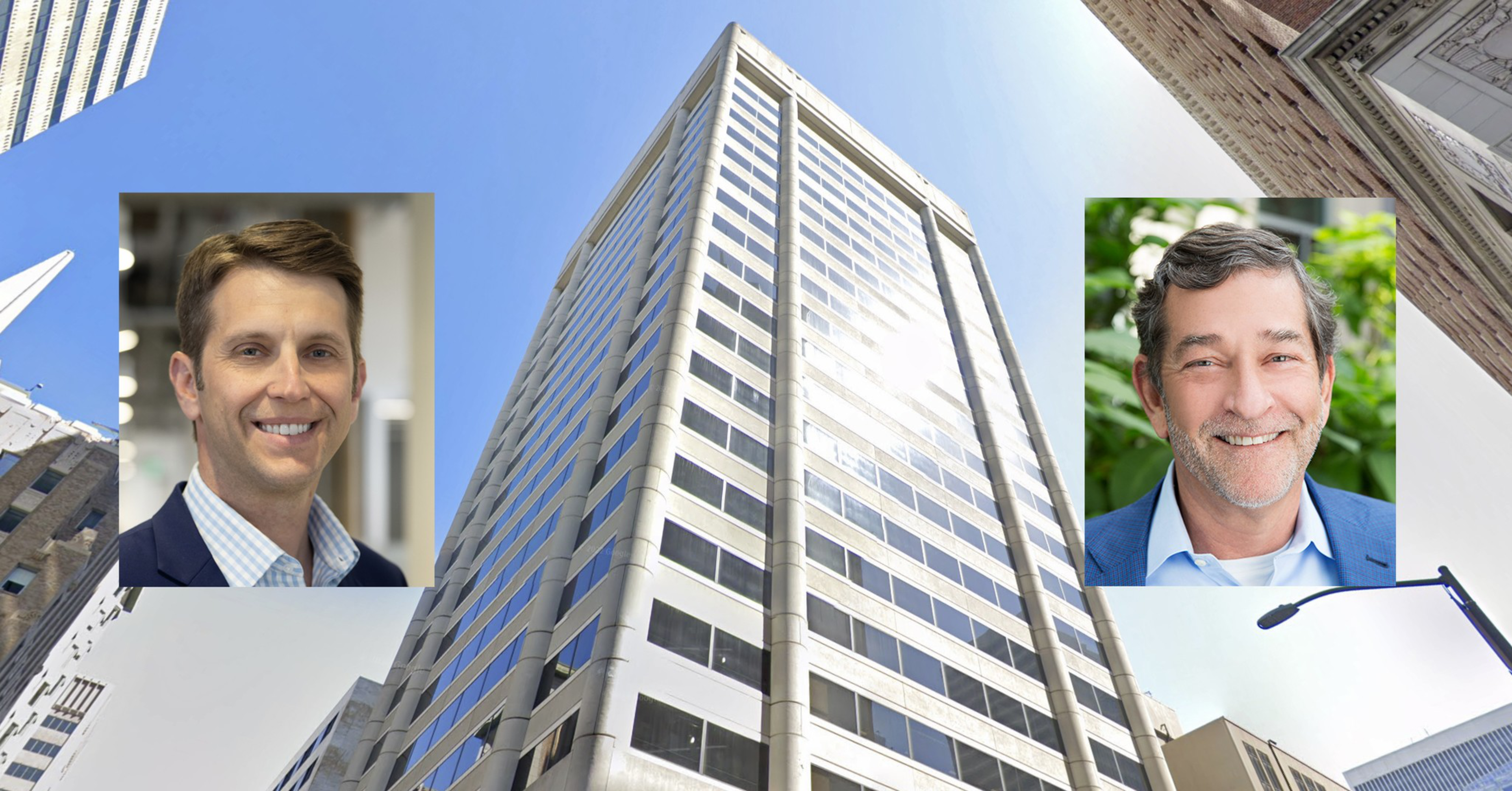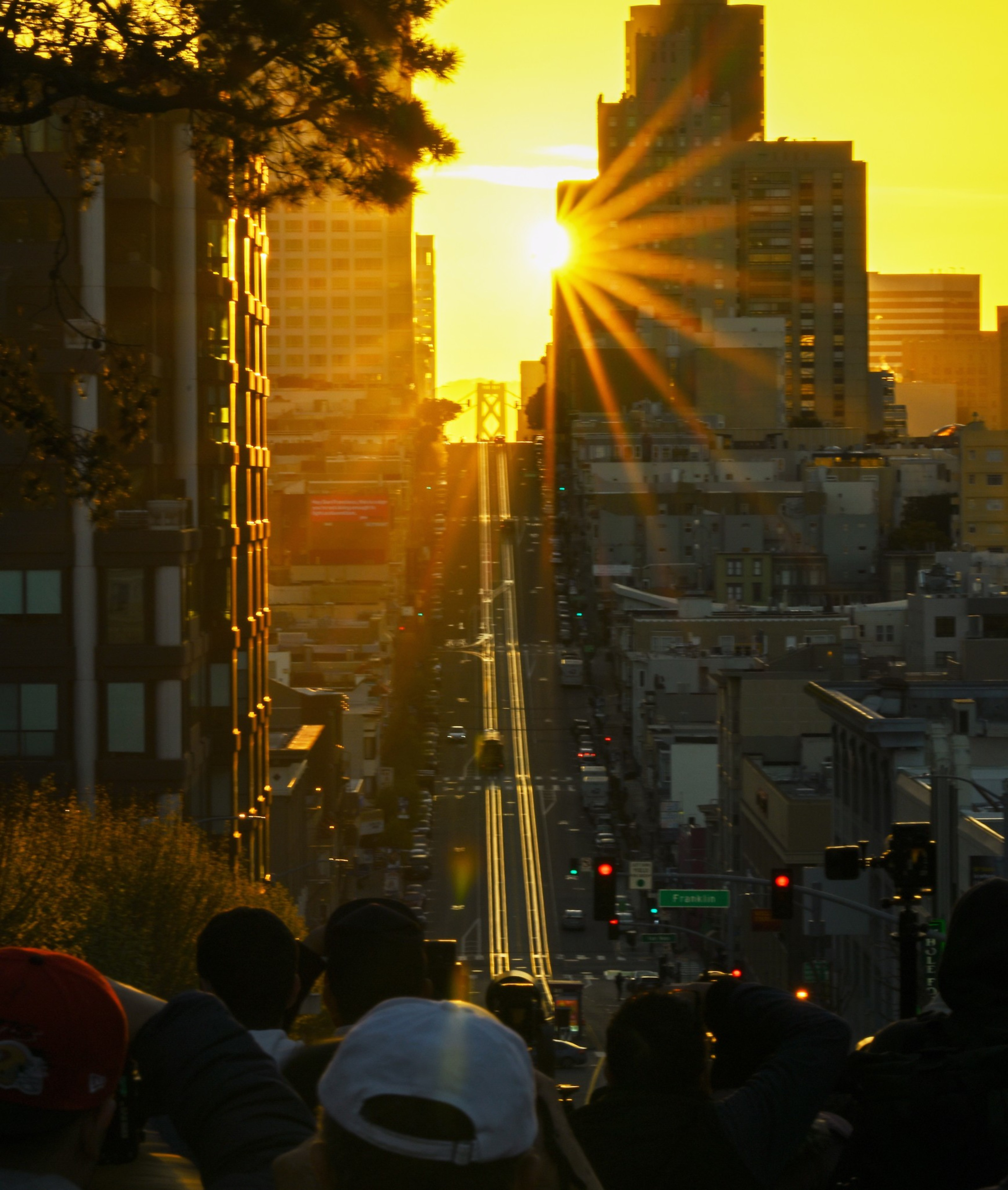Two times a year—when the Earth’s orbit aligns—the sun rises perfectly up California Street with the Bay Bridge in the foreground, splitting a warm glow across a sliver of San Francisco skyscrapers.
The cosmic event, known as “California Henge,” draws influencers, tourists and weary office workers alike to what has long been the city’s premier business address.
A different kind of phenomenon is now taking place along the famed corridor, and it has nothing to do with an eclipse or the aurora borealis. Rather, the stars are aligning for empty California Street office buildings to find new life.
At least, that’s how developer Roger Fields of Peninsula Land & Capital must feel right now. Last summer, his real estate company, primarily based in South Bay, entered the San Francisco office market for the first time by purchasing 550 California St. for about $43 million, less than half of what the 13-story building was worth nearly two decades prior.
“To pay that price for a building in great shape, in a location like that, is just unheard of,” Fields previously told The Standard.

Fields said this week his firm had just inked nine new leases at the previously vacant skyscraper in the heart of the city’s Financial District. It might not be a magic sunrise, but it’s a badly needed ray of light on the city’s beleaguered office market.
That possibility is enabled by a wave of new building owners, like Fields, who are acquiring premier real estate at a discounted price and passing those savings onto tenants who otherwise would’ve been priced out of the area. Around this time four years ago, the average asking rent for office space on California Street was $90 per square foot, according to real estate firm Cushman & Wakefield. Today, that number is closer to $62.
An outsize impact
As opposed to the tech companies that primarily dominated the last real estate boom and drove up asking rents, the new tenants come from a variety of industries, including professional services, hospitality and biopharmaceuticals.
Taken altogether, the building at 550 California St. will be nearly 20% occupied after those companies move in. Once his firm can get the place at least half full, Fields said he’d like to see a restaurant on the ground floor.
“That just means we’re going to have to do more transactions to fill it up,” Fields said.
Which spaces are in demand has also changed. Rather than a single large firm leasing an entire building in anticipation of future growth or a unicorn funding round, Fields said he’s noticed that most tenants now in the hunt for new office spaces in San Francisco are of the small- to medium-size varieties, which don’t necessarily need an entire building or a floor at a grand skyscraper but still want to be in the heart of downtown.
His building’s confirmed list of new tenants includes Core Hotels, Peak Technology Partners, Genedata, Kevala, Tobin Capital, Behmke Reporting and Video Services, law firm Miura & Partners, United Litigation Discovery and Optime.
Before the pandemic, setting up camp in San Francisco’s northern Financial District, where the city’s first monumental skyscrapers were erected, likely wouldn’t have been an option for many of these companies. For example, the entirety of 550 California St., considered a Class B building today, was once occupied by Wells Fargo.
Today, 27 office towers totaling over 8 million square feet line the California Street corridor, according to Cushman & Wakefield. Of those, five buildings are over 50% vacant, with six more trending in that direction if no new leases are signed. Meanwhile, at least 10 buildings are over 80% occupied.
All told, approximately 33% of California Street’s offices are currently vacant, and the overwhelming majority of those offices on the market are under 10,000 square feet. Because most of San Francisco’s office space is concentrated downtown, those figures mirror the citywide 34% vacancy.

Robert Sammons, senior director of research at Cushman & Wakefield, said because California Street is bookended with large “Tier 1 trophy” buildings, the street has an outsize impact on setting pricing and expectations for the overall market.
Fields, whose Twitter bio says he’s “actively seeking acquisitions,” manages nearly 50 commercial and industrial properties outside of San Francisco.
“Right now, we know we have the best value in town,” he said. To compete with the glut of available, often newer, office spaces in town, Fields said he’s been flexible with rent terms, even signing a one-year lease if it gets a deal done. Traditionally, office tenants signing direct leases would commit to five- or 10-year terms.
But big lease deals are not totally out of vogue. Last month, Rippling, the well-funded HR automation company, migrated north from SoMa, where it had outgrown its digs at 55 Second St. and signed a multiyear lease at 430 California St., where it will now occupy a whopping nine floors. The technology firm requires its employees to come into the office at least three days a week.
Rewriting history
A month before Fields successfully landed his building, real estate firms SKS Partners and the Swig Company partnered to purchase 350 California St. just down the street for around $61 million, a roughly 75% haircut from the price the seller shopped the property for in 2020.
The new owners of the Class A office building leveraged their personal connections to bring on two new tenants near the start of the year. Paul Stein, a managing partner at SKS, whose father founded Bridge Housing some 40 years ago, helped steer the nonprofit developer toward a long-term lease for the entire 16th floor of the building in January.

Shortly after, when the former CEO of coworking company RocketSpace Inc., Duncan Logan, needed a home for his new climate change-focused company called 9Zero, he leaned on his previous connection with the building owner to lease the fourth and fifth floors of the 22-story building. Years prior, Stein was Logan’s first landlord at 181 Fremont before the Jay Paul Company redeveloped the site.
The company officially unveiled its new space to the public during SF Climate Week (opens in new tab) last month, where it hosted over 3,000 visitors at the building’s sleek glass-encased mezzanine and its leased floors.
Like a cross between LinkedIn and WeWork for climate technology companies, 9Zero offers paying members access to an exclusive online networking platform and lets them reserve and rent office space within the company’s facilities at 350 California St.
The new space also regularly hosts events and programming in a bid to maintain the momentum that would previously evaporate after the end of a San Francisco climate-change convention.
Here, in one of the city’s most famed corridors, the 9Zero team is hoping to build a critical mass for companies focused on environmental issues. Think Wall Street but for climate bros.

“If you outgrow your offices here, that’s good,” 9Zero co-founder Matthew Joehnk said. “There are more floors in this building that could use you.”
Kieran White and Andrew Porter are some of the fresh new faces making use of the business-class digs. The duo started their company, Curo, which facilitates access to underutilized electric vehicle charging stations, less than a year ago.
They cycled through different coworking spaces and White’s living room before renting two permanent desks at 9Zero, where they have a corner view of California Street below.
“It’s the vision of the [9Zero] community that sold it for us,” White said. “We’re around people who are interested in the same things.”
Porter, who rides an electric scooter into the office from North Beach every day, said the location has the right blend of fun, convenience and safety. Additionally, he and White are hoping the prestige of the location will attract talent and investors.
Soon enough, they’ll be joined by others who want in on a piece of classic San Francisco history on the cheap. The building next door at 300 California St. is reportedly under contract to be acquired by local investors Redco Development and GCI General Contractors.

The San Francisco Business Times reported the final sale price (opens in new tab) is expected to be around $28 million. The building last traded hands for twice as much in 2014.
Another building at 255 California St. is also close to being sold for around $53 million, sources say, a roughly two-thirds discount from the price that the previous owners purchased the property for in 2019.
Call it an office reset, planetary alignment or whatever you want. Any way you slice it, the city’s top skyscrapers on the most prestigious strip of downtown are for sale.
